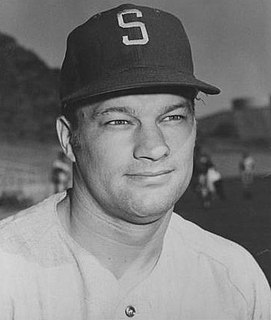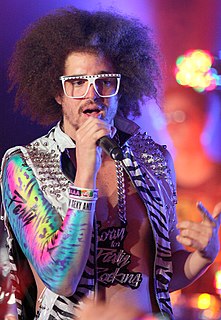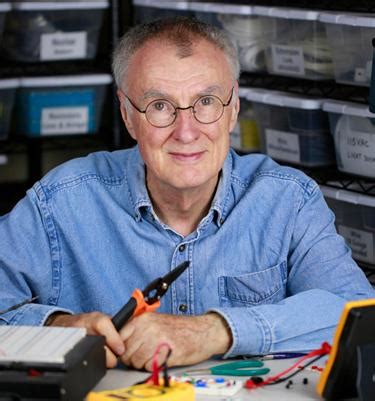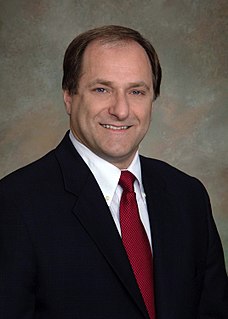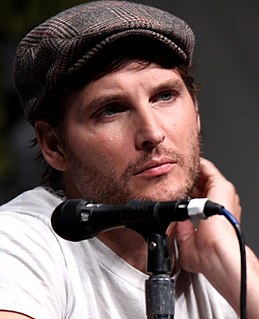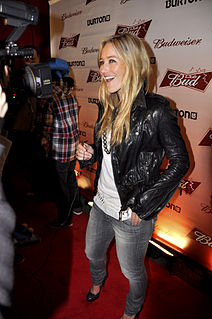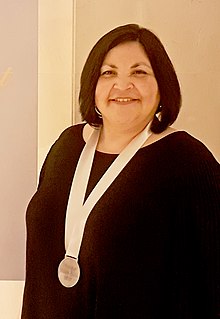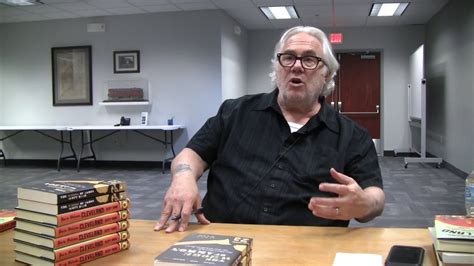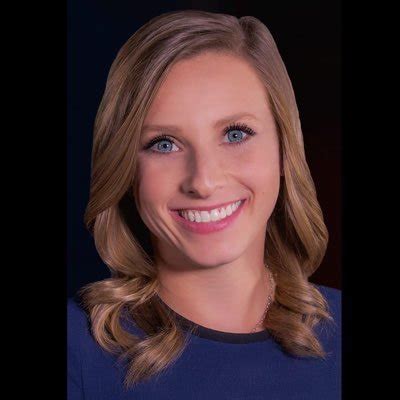Top 167 Lenses Quotes & Sayings - Page 3
Explore popular Lenses quotes.
Last updated on April 22, 2025.
I think it[3D] should be used as a new artistic form, not as a gimmick, not to impress you but the existence of an environment that you view as a theatrical dramatic experience is - you don't just have the X-Y axis, you have the Z and that makes a difference. You still have the framing, you still use lenses, so most of the cinematic rules and languages still apply but I think it's a different existence.
This is a good look. I'm gonna mess him up," Pattinson praises Stewart. "And I'm just like, I don't know what's going on? Where am I? I just walked out of a flower bed in this scene as well.... I was standing in the flower bed and then walked out of it and then stopped and looked confused.... If I didn't have contact lenses on, that was a really spectacular look I just did.... I should have had million thoughts, like Hamlet.
We are talking about mutated women, the result of cruel genetic experiments performed by fashion designers so lacking in any sense of human decency that they think nothing of putting their initials on your eyeglass lenses. The leading cause of death among fashion models is falling through street grates. If a normal woman puts on clothing designed for these unfortunate people, she is quite naturally going to look like Revenge of the Pork Person.
What the studio didn't understand is that surfing is about a billion times more dangerous than skydiving. They would not allow the boys to skydive, but they allowed us to surf in pipeline in Hawaii. Nine-hundred foot waves. So we're out there in the middle where the greatest surfers in the world surf. They have these long lenses on from the beach, so they can't see anything. They are just shooting our faces in the Point Break.
Jim Pagliaroni joined the club tonight and is going to be a welcome addition. He was describing a girl that one of the ballplayers had been out with and said, “It's hard to say exactly what she looked like. She was kind of Joe Torre with tits.” This joke can only be explained with a picture of Joe Torre. But I'm not sure any exist. He dissolves camera lenses.
The camera follows a young woman as she makes her way through the stands to an area set aside for repentance and conversion. But Jesus' stories imply that far more may be going on out there: beyond that stadium scene, in a place concealed from all camera lenses, a great party has erupted, a gigantic celebration in the unseen world.
I really love it, I love working with directors that are very collaborative and allow me input. I've done over 75 films, it's just like you're an apprentice. You learn so much about camerawork, lenses, and I'm always talking about DPs and directors and they always give me lists. I think pretty soon, I'll be ready to move away from being in front of the camera.
I have some advantages of viewing from the two lenses, the two perspectives. I think that a lot of visual artists who come back here from the United States and are Cambodian also write from their American references - looking inside the old culture, and looking at themselves as an American looking into the country where they were born.
It is essential for the photographer to know the effect of his lenses. The lens is his eye, and it makes or ruins his pictures. A feeling for composition is a great asset. I think it is very much a matter of instinct. It can perhaps be developed, but I doubt if it can be learned. To achieve his best work, the young photographer must discover what really excites him visually. He must discover his own world.
It's true that I don't think I'd be a good director. If I were a director, I'd try to hire the best people I could and then leave them alone. I don't know much about cameras or lighting, so I'd make sure that I had a really good cameraman who understood lenses and lighting, and I say to him, "This is the scene we have to shoot and this is what I think it should be, you go do it." Same with actors. But really, very good directors who know everything do basically the same thing. They hire you and then they leave you alone.
Forgiveness is not a moral issue.
It is an energy dynamic...
Forgiveness means that you do not carry the baggage of an experience.
When you choose not to forgive,
the experience that you do not forgive sticks with you.
When you choose not to forgive,
it is like agreeing to wear dark, gruesome sunglasses that distort everything,
and it is you who are forced every day
to look at life through those contaminated lenses
because you have chosen to keep them.
I don't think I can break down any doors, but I'm thinking, "Maybe I can be a cameraman, because I love the cameras." And the cameraman would show me how to thread the film, how to repair it, the lenses. That's when you become, like, goony goo-goo about it. You breathe and eat camera, and all of a sudden, you don't want anything else in the world. You finally know, "This is my calling." When you're passionate about something, it doesn't become work. It's art and it's fun. It's arduous, it's sweaty.
At 3-D Imax theaters, audiences have shown they are willing to pay a premium to wear headgear fitted with liquid-crystal lenses synchronized via infrared signals with the movie projector, which runs at twice the normal frame rate. These movie viewers plumb new depths in depth perception - they experience extreme realism.
Give half a dozen men the same camera, lenses and plates, and send them to the same place to do the same thing, and all the results will be alike, or so nearly alike as to reveal the real mechanicalness of photography. Yet, curiously enough, this is just one of the most difficult things a photographer can be set to do, to exactly repeat himself, or another. He may use the identical apparatus, know the subject perfectly, and yet be totally unable to bring away an exact replica.
You realize after you travel enough that there's some things that, no matter how good you are at making television, no matter how good your cameras are, how well it's edited, there's no way the lenses could have captured the moment, and there's no way you will ever be able to write about it and do it justice.
For me, vision is just about the most important thing. So goggles play a huge role in my sport. I come to the competition with a bunch of different goggles and tons of different lenses in multiple tints. The weather can always be changing, and you have to have the right thing to make sure you can see perfectly.
In case any are puzzled by the different translations from which I draw strength and help and delight, it is like this: In studying any object with the microscope we use different lenses and turn the mirror in various ways; each change brings out some new wonder and beauty. So it is for those who are not Greek or Hebrew scholars, and who use the work of scholars to open the meaning of the exhaustible Word-the Bible is richer than any single version can fully show.
When I was in film school I had this great professor, Jerzy Antczak, a Polish filmmaker, and Joe Russo of the Russo Brothers were in my class. It was this kind of Easter European philosophy of motivating camera only through character and motions, and just exploring with lenses. That was the best year of my education in my life.
Remember the movie 'The Matrix,' where virtual information popped up to help inform physical day-to-day reality? Such things won't always be the stuff of Hollywood. If the Internet is accessible via contact lenses, biographies will appear next to the faces of the people we talk to, and we will see subtitles if they speak a foreign language.
There's nothing easy or simple or even entertaining (in our contemporary American sense of that word) in disciplining our minds to "see" reality through biblical lenses; it takes effort and time. But Christians who don't take that effort and time will inevitably succumb to some of the anti-biblical and anti-Christian messages that bombard us every day through advertising, entertainment, etc.
We all have our own takes on things. To being yourself. The abstract, the whole thing that I play with, seems to result in seeing through your lenses, and once you express how you see things to others, you start to see there are similarities between all people. It's kind of like, no matter how far you go, you're still where you started, in a way.
The good news is we are seeing an incredible surge in non-animal technologies in laboratories. With researchers using stem cells, visually impaired people may one day have new corneas and lenses grown from their own cells. That is likely to be a more effective and cheaper approach than using animals.
People with antisocial personality disorders aren't automatically bad - they simply approach the world with a more ruthless set of lenses. The lack of empathy or very weak empathy and the ability to read other people's weak spots can be a flammable combination when you get in the way of something they want. But they aren't a different species. They're a part of our spectrum.
I didn't play the Ghost Rider in the first movie. That was a stuntman. In this film, the Ghost Rider feels much more alive because I did put some thought into how he should walk and into how he should move. I was so into the character, in fact, that I would paint my face with white and black makeup to look like a skull. And I put on blacked-out contact lenses, so I almost looked like an Afro-New Orleanian voodoo icon by the name of Baron Samedi. Oh man, I would walk around the set without saying a word to anybody, and I could see the fear in my co-stars' and co-directors' eyes.
Real artists find answers. The knowledge of the artisan is within the confines of his skills. For example, I know a lot about lenses, about the editing room. I know what the different buttons on the camera are for. I know more or less how to use a microphone. I know all that, but that's not real knowledge. Real knowledge is knowing how to live, why we live, things like that.
Politicians, real-estate agents, used-car salesmen, and advertising copy-writers are expected to stretch facts in self-serving directions, but scientists who falsify their results are regarded by their peers as committing an inexcusable crime. Yet the sad fact is that the history of science swarms with cases of outright fakery and instances of scientists who unconsciously distorted their work by seeing it through lenses of passionately held beliefs.
[T]he unsympathetic assessments we make of others are usually the result of nothing more sinister than our habit of looking at them in the wrong way, through lenses clouded by distraction, exhaustion and fear, which blind us to the fact that they are really, despite a thousand differences, just altered versions of ourselves: fellow fragile, uncertain, flawed beings likewise craving love and in urgent need of forgiveness.
Sixty-five days principle photography, five-day weeks, which is the only way I'll work. With my cinematographer Russell Boyd, we take as much time as possible before pre-production, looking at stills. The next most important thing: he will come to me and talk about lenses. And I'll see his plan, which is generally great, and I might talk about how the light will be, handheld or not? I talk very freely, and try not to talk specifically, just talk around it, because it can unlock all sorts of things.
It is part of the pholosophic dullness of our time that there are millions of rational monsters walking about on their hind legs, observing the world through pairs of flexible little lenses, periodically supplying themselves with energy by pushing organic substances through holes in their faces, who see nothing fabulous whatever about themselves.
I think some people need the assurance of people around them and ideas worked out in advance. I think it keeps me an edge that to be creative on the spot. You have to think of things to do when you meet people. You limit your choices from the beginning. So I don't bring a lot of lenses, cameras, all these elements that can help the picture to a shooting. You confine yourself to, say, one room and you just make it work. You become very creative in that little space. You have left a lot of other options out of the game.
Do I believe the execution will work out? Les Moonves said yes to Survivor based partly upon my show Eco-Challenge. He liked my way of filming outdoors. It was the first use of helicopters on a documentary with the gyro-stabilized lenses. And a certain beauty of filming, allowing the drops to fall from a leaf into a puddle, allowing a spider to weave a web. Taking the breath to allow that to happen rather than showing scene after scene.
If I learned one thing, it is that self-doubt is one of the most destructive forces. It makes you defensive instead of open, reactive instead of active. Self-doubt is consuming and cruel. And my hope today is that we can all collectively agree to ban it. .?.?. Think to the moments of your life when you forgot to doubt yourself. When you were so inspired that you were just living and creating and working. Pay attention to those moments because they're trying to reach you through those lenses of doubt and trying to show you your potential.





